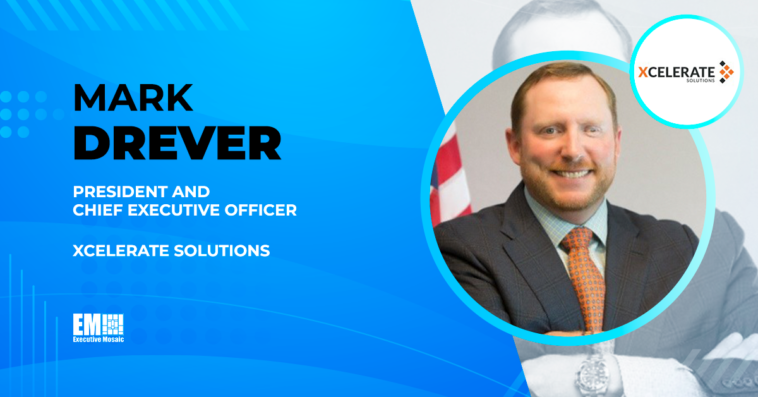Founded on the eight-year anniversary of the September 11, 2001 attacks, Mark Drever and partners developed Xcelerate Solutions with the intent of focusing its enterprise security, strategic consulting and digital transformation services to protect national security. Over the course of the last 15 years, Mark Drever has solidified Xcelerate as a trusted partner of agencies like the Defense Counterintelligence and Security Agency, Defense Logistics Agency, Department of Homeland Security and Defense Information Systems Agency, among many others.
In co-founding and leading Xcelerate as CEO, Drever draws on decades of experience in management consulting Fortune 100 companies such as PricewaterhouseCoopers and IBM. His pursuits across his career have netted over $500 million in new business. This year, he was instrumental in negotiating a merger with VMD Corp that resulted in an even more dynamic combined enterprise.
Drever connected with ExecutiveBiz for a brand new Spotlight interview, during which he discussed the most pressing threats to American prosperity—including identity fraud and cyber crime—and illuminated how recent federal workforce trends are affecting the government contracting sector.
What do you think are the most pressing national security threats we’re facing today? How is your organization addressing these threats?
I consider ineffective identity management the bullseye vulnerability in national security. Addressing this issue is our prime target because verifying, controlling and monitoring identities are critical factors in securing our borders, recognizing and preventing threats, enforcing laws, defending against cyber-attacks and protecting critical infrastructure. Effective identity management strengthens the government’s overall security posture and improves the resilience of our nation against diverse security challenges.
Identity fraud is the gateway by which individuals gain access to protected resources, facilities and systems. At Xcelerate, we are committed to making the bullseye target smaller to reduce potential threats. We begin with extensive personnel vetting services and work closely with government agencies to implement security processes and protocols to protect the enterprise across the digital landscape through enhanced cybersecurity and proactive protection of the critical infrastructure.
Do you think the United States’ cybersecurity efforts are keeping up with demand? If not, how can we accelerate and broaden cybersecurity?
Clearly the answer is no. Every news channel and social media platform reports weekly security breaches—from healthcare to water systems, to schools—nothing is safe. Our adversaries are escalating and ever evolving. Vulnerabilities are rampant in our increasingly digital world.
The Sandworm attacks on the Ukrainian power grid by Russian hackers signaled a new level of cyber warfare. On April 2, the Cybersecurity and Infrastructure Security Agency released an emergency directive to determine the impact of the Midnight Blizzard Microsoft breach to federal agencies. An incredible 80 percent of school IT professionals reported to Education Week that their systems had been targeted by ransomware. These are just a few examples of the frequent reports that illustrate today’s risks run very broad and deep.
Unfortunately, there is no end in sight. As a nation, we need to invest in education and training of a cyber strike force, digital soldiers if you will, to prepare to counteract future threats. As an immediate solution, we at Xcelerate are engaging in protection on multiple fronts—starting with identify management and continuing with a strong commitment to cybersecurity, as well as enterprise and critical infrastructure protection.
Where do you see Xcelerate in 10 years and what are the concrete steps you have to take to get to that stage of evolution?
We have positioned Xcelerate for growth. In ten years, our goal is to be an end-to-end leader in security with a comprehensive portfolio resulting in $1 billion in revenue. We have already taken significant steps toward that goal. In late 2022, we completed an investment partnership with McNally Capital to position Xcelerate as a platform company for continued growth through mergers and acquisitions. This strategic alliance is allowing Xcelerate to capitalize on McNally’s experience and expertise while positioning Xcelerate for expansion of capabilities, contracts and the company as a whole.
On February 6, Xcelerate merged with VMD Corp, a company that shares a similar commitment to safeguarding the homeland. The combined company offers a myriad of security solutions—from the individual to the enterprise, with expanded cybersecurity and critical infrastructure protection capabilities.
The merger with VMD expanded Xcelerate’s market coverage and security offerings, bringing contracts with new agencies and positioning the company for further organic growth, as well as expansion through additional complementary acquisitions. Xcelerate now has new contracts and capabilities, as well as an established foothold in the Department of State, Transportation Security Administration, U.S. Air Force, the National Science Foundation and several others.
In 2024, Xcelerate tripled our revenue, expanded our portfolio offerings and has been awarded several new contracts. We are well on our way to hitting our future revenue goals. We are also continuously identifying and evaluating new acquisition targets that will even further accelerate our growth. For Xcelerate, the best is yet to come!
What do you think is the most overlooked part of the bid process, and how does your company set itself apart from its competitors in this area?
The post-pandemic world of government contracting is difficult. Quite simply, the government is not showing up. Government personnel at all levels are teleworking, making it exceedingly difficult to engage during the crucial market research phase of procurement. No longer are agencies amenable to meeting with contractors to whiteboard ideas, hear about innovation, or share information that would be most advantageous to mission support.
Another challenge we see is the aging acquisition workforce. Across government, retirement is affecting the institutional knowledge and experience that is critical in decision making roles. This truly presents a challenge as we face the sophistication of the next digital revolution—cognitive AI, machine learning, robotic process automation and future technologies. To gain the most value from these technologies, buyers require understanding, experience and expertise. This is where a partnership with industry innovators, including face-to-face interaction among the best and the brightest, is critical. Unfortunately, right now this doesn’t often happen.
Understanding the current landscape, Xcelerate concentrates on expanding our reach and broadening our relationships in existing customer agencies. We identify and develop solutions to opportunities early and use various paths to engage with the key decision-makers. Our differentiated security solutions often drive in-bound inquiries or at least position us to approach clients with experience and information that is meaningful to them, which has been successful in opening doors for Xcelerate.





